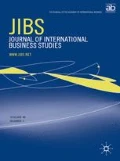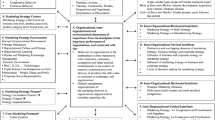Abstract
This paper presents 3 empirical tests of the product life cycle theory based on U.S. trade data and on a relatively new data series providing information about a larger number of products and at a lower level of aggregation than the data used previously. The results of the tests strongly support the hypothesis that industrial product groups behave in the manner predicted by the product life cycle theory on world markets. In the case of individual products, however, the results provide less support for the theory. The policy implication is that development strategies should rely on industrial sectors rather than on individual commodities.
Similar content being viewed by others
Author information
Authors and Affiliations
Additional information
*Alicia Mullor-Sebastián is an economist with the International Monetary Fund and has published in the fields of trade and development.
Rights and permissions
About this article
Cite this article
Mullor-sebastián, A. The Product Life Cycle Theory: Empirical Evidence. J Int Bus Stud 14, 95–105 (1983). https://doi.org/10.1057/palgrave.jibs.8490530
Published:
Issue Date:
DOI: https://doi.org/10.1057/palgrave.jibs.8490530




